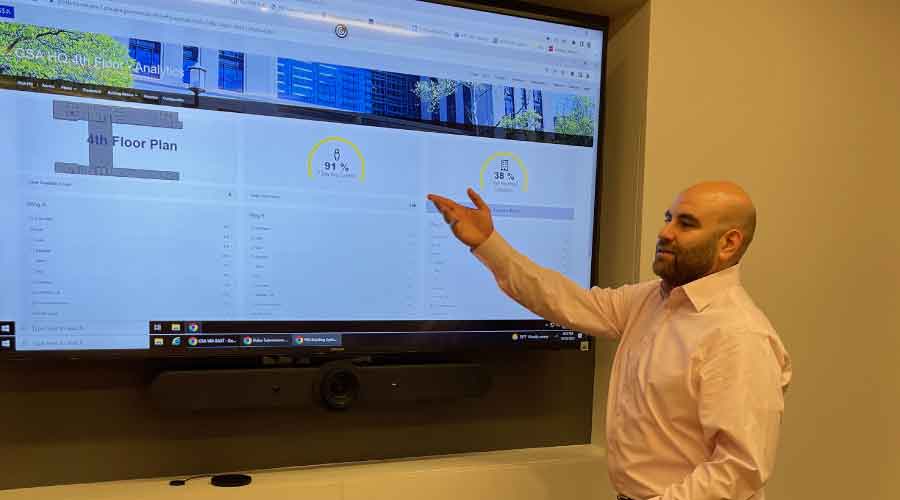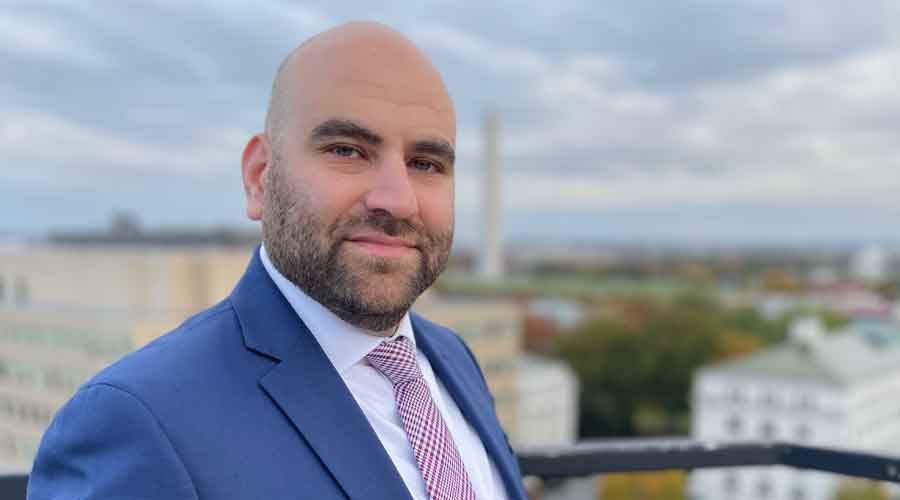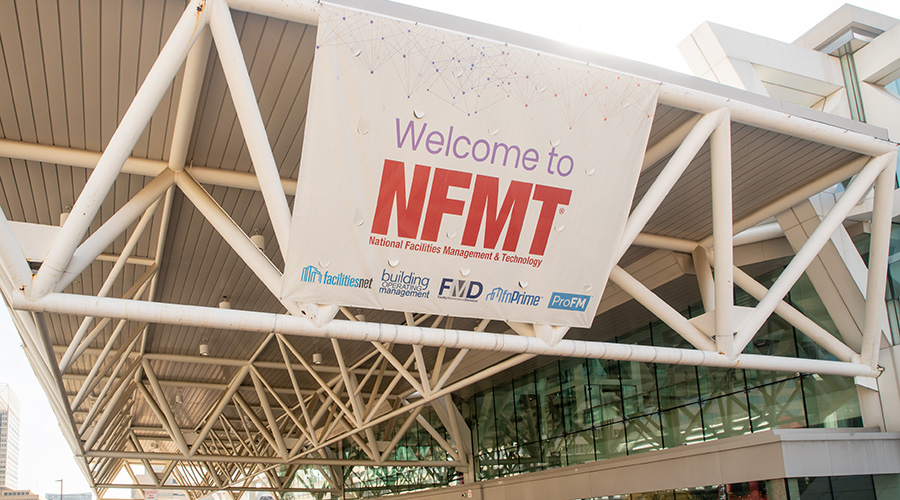Lev Schuchalter Sets Career Path Focusing on Government Facilities
Lev Schuchalter helps oversee the White House and about 600 federal buildings in the nation's capital.
By Dave Lubach, Managing Editor
OTHER PARTS OF THIS ARTICLEPt. 1: This Page
Levron Schuchalter has spoken on facilities management topics plenty of times during his career, but this time was different.
Earlier this year, Schuchalter presented to the High-Performance Buildings Congressional Coalition at the Rayburn House Office Building – one of three buildings used by the U.S. House of Representatives. Even for someone whose facility responsibilities include the White House, this was a big deal.
“I vividly remember entering the room where I would be presenting, seeing the seal of the House of Representatives, and having a sense of inspiring awe, thinking to myself that was exactly where I had seen many Congressional testimonies occur on TV,” Schuchalter says. “To be in the room and able to showcase and advocate for the amazing work that the General Services Administration has done to modernize facilities management and operations was both humbling and exciting. It was an opportunity I certainly relished.”
Congressional presentations are not typically on the list of responsibilities for facility managers, but Schuchalter has a unique job. The 39-year-old is the deputy director of Facilities Management and Services Program for the National Capital Region (NCR) of the General Services Administration (GSA). NCR comprises approximately 600 owned and leased buildings and 92 million square feet in an area that includes Washington D.C., and parts of Maryland and Virginia. The portfolio of buildings Schuchalter advises house some familiar agencies – the Environmental Protection Agency, the Internal Revenue Service, and the Department of Energy in addition to the highest profile building in the country, the White House.
On any given day, one of Schuchalter’s buildings could be hosting visiting heads of state, supporting political appointees, or naturalizing U.S. citizens, so his team has to be ready for anything from safety concerns to uncomfortable temperatures in a building. As many facility managers are quick to say, no one day is the same.
Unintended path
For a career government official, Schuchalter found the perfect situation to carve out a career.
“I want to make sure that I have opportunities to be challenged, and to work with really good people,” he says. “That’s inspiring.”
Schuchalter graduated from the University of Maryland in 2005 with a degree in finance and plans to head to Wall Street before having a change of heart.
“I interviewed with Lehman Brothers to do investment banking, was going to do that, and I decided I really didn’t want to be in New York,” he says. “Combined with that, I’ve always felt a kind of sense for service.”
So instead of working with stocks and bonds, Schuchalter opted for budgets and facilities. He took an internship with GSA as a financial management specialist which included forming budgets for each of the 11 GSA regions across the country. The GSA owns and leases 377 million square feet of space in 9,600 buildings nationwide.
“Before I started, I’ll be honest, I didn’t know what GSA was,” he says. “Then I found out it was this crucial government agency that has two very large business lines, one being the Public Buildings Service, where I am, and the other large business line being the Federal Acquisition Service. But I knew nothing about GSA, and I heard finance, and thought that sounded like a close fit.”
The position required three-month rotations at GSA offices in Washington D.C. and travel to other cities such as Fort Worth, Texas, and Atlanta. The experiences opened his eyes to a career that would eventually lead him into the facilities world at GSA, an independent U.S. agency that owns, leases and operates federal buildings. The experience put Schuchalter on a learning curve he did not anticipate upon graduating from college.
“After doing these rotations, I learned all of the amazing things that GSA does,” he says. “As a result, I placed in what was called the Building Security and Policy Division for the Public Buildings Service, and that kind of started me on my road with real estate, government facilities and facility management as a whole.”
Strength in training
As he moved up the ladder at GSA, Schuchalter’s resume started to more closely resemble one of someone in facilities management. The more he entrenched himself in this industry, responsibilities in fire protection, safety and health and risk management were added to his plate.
One aspect of facility management where Schuchalter truly started to carve out a niche was in training. As a national program manager in GSA’s Office of Facilities Management (OFM), he helped create “The Future of Facilities” program, developing projects that included creating an organizational vision, forming, planning and developing change management plans for 2,000 employees. The program included managing and integrating subject matter experts into facility operations while also incorporating new technologies and processes to improve efficiencies in OFM operations.
Those experiences led to Schuchalter becoming the OFM’s first director of training in September 2017. The new role gave Schuchalter the opportunity to develop programs to help GSA comply with the Federal Buildings Personnel Training Act (FBPTA) of 2010, which requires all federal personnel in building operations and maintenance services to demonstrate proficiency across various competency areas.

“He’s passionate about training, and I always tell Lev, as his former boss, that you can’t make passion happen. You either have it or you don’t, and passion turns into results,” says Larry Melton, who was an assistant commissioner in OFM before leaving to become the CEO and president of The Building People, which works with clients in the federal and commercial sectors to improve the efficiency in their facilities.
“I saw his vision, under the FBPTA, when that was signed into law, he kind of took the bull by the horns,” Melton continues. “A few years later, I'd already departed GSA, but Lev’s passion for aligning people and technology was pretty evident. And that’s when he really started digging in and really understood the strategic side of how people’s skill sets aligned with the vision of future facilities.”
Being named to the director’s role was one of the prouder moments of his career, Schuchalter says. It was a role he held until March 2019 before moving to the regional position with NCR.
“Facility management is a rough job for some,” he says. “There are constant hours, constant change, and a lot of pressure. Helping to get people motivated and letting them know what it takes to be successful is huge.”
Assigned with developing training programs, Schuchalter reinvented national training programs for more than 2,000 geographically dispersed facilities management employees.
He led the creation of a three-day “Essentials of Facilities Management (EFM)” training course that became mandatory for 1,500 OFM building managers and operations and maintenance technical professionals. The training course comprised of modules covering key workforce duties such as building contracts, operations and maintenance management, custodial services, elevators, inspections and surveys, risk management, energy and sustainability, building systems, lease and space management, physical security and continuity of operations and customer service.
In addition to meeting the requirements of the training act, Schuchalter also emphasized the training’s importance to prepare for the inevitable attrition that facilities of all kinds experience, especially during the current “Great Resignation” era and the increasing trend of many facilities workers retiring. He also wanted to ensure that the participants enjoyed the course both personally and professionally so they would want to improve their skill sets and stick around.
“The feedback that we got on the course was astronomical,” he says. “People who are taking it are laughing and having a good time, they’re participating, socializing and networking. Of course, that’s what you want, but to be a truly impactful training course, you also need to ensure effective knowledge transfer. With EFM, we were able to hit the sweet spot.”
That ability to inject personality with professionalism is a strength of Schuchalter’s and helps him build a connection with his peers.
“Lev is an effective leader because he’s also a great team member,” says Shauna Carter, director, OFM. “He leads by example and his passion and excitement for his initiatives and projects translates to his team members and others throughout the organization. He partners well with others and ensures that he is knowledgeable and well-versed in his areas of responsibility and provides his team with the necessary resources to be successful.”
Looking forward
As a facility leader in the nation’s capital with a portfolio that includes critical buildings like the White House and Food and Drug Administration, that customer list is long and demanding.
“My customers are the service centers, the tenants, other GSA regions and business lines, my team,” says Schuchalter, whose team includes more than 500 NCR employees, seven direct reports and 60 second- and third-level employees, all of whom have a complex set of roles and responsibilities.
Since taking over as NCR’s deputy director in 2019, Schuchalter has focused on building management modernization. His projects have included: leading the technology initiatives of the Facilities Modernization Office; designing and implementing a new organizational structure for the Facilities Management and Services Programs Division; revamping the way that contract vehicles are used to execute on technical facilities management requirements; reimagining partnership opportunities between energy, sustainability, smart buildings and operations and maintenance groups; shepherding the use of technology into improvement of legacy business processes; and instituting operational and organizational changes that resulted in a nearly 11 percent reduction in energy utilization and savings of more than $8 million in one fiscal year alone.
Schuchalter is one of those people who are comfortable stepping out of their comfort zone, and that trait helped his team win a 2022 National Facilities Management Award for Excellence in Innovation.
Despite all of his work experiences, Schuchalter did not have an extensive background in smart buildings technology. So, when tasked with making buildings in the region smarter, Schuchalter dove in head-first, “taking myself to school and learning about this nuanced subject matter,” he says, through listening to speakers, researching the internet, and reading technical guidance documents.
The research included peppering co-workers across the nation with questions to increase his knowledge base, another quality that endears him to his peers.
“Lev is authentic, a great communicator, empowers others, and allows them to showcase their talents,” Carter says.
Recognizing the negative impact that buildings contribute to energy consumption and greenhouse gas emissions, reducing the impact that NCR buildings have on the environment was a priority. So Schuchalter and Lee Turner, the new smart buildings branch chief that Schuchalter onboarded specifically to help NCR embrace building technology, teamed up to create the Regional Operations Center (ROC), which has a physical space in Washington D.C., but also provides a virtual platform that allows for building systems data to be viewed and controlled remotely via a secure, web-based portal.
The ROC helps managers measure such data as energy demand, building comfort, HVAC scheduling, and critical alarm system indicators with the ability to customize views to monitor and assess energy use and make better decisions on future operational strategies.
“I tell people it is our job to make sure that 10 years from now, we're not doing work the same way we were 10 years ago,” Schuchalter says. “We have all these amazing tools at our disposal, so let’s leverage that. Let’s leverage these new and emerging technologies to truly modernize our efforts.”
Working for the government, especially in Schuchalter’s position, offers many different challenges that other facility managers do not have to deal with. Change within the agencies is not something that is always readily embraced. If it is, progress comes at a snail’s pace. As Melton noted from his years in the public sector, “the agenda and priorities of an organization can change every four or eight years. Priorities shift and you’ve got to move at lightning speed.”
There have been opportunities move on to something else, but so far nothing has enticed Schuchalter to take that next step. Considering the energy and passion he still brings to the job he has, that seems unlikely to change anytime soon.
“I’ve been so fortunate and been afforded all these unique chances to grow and try new things and develop,” he says. “I’ve never been bored. I’ve never been in a position where I felt compelled to look for something else. I’ve had a number of opportunities that have come my way, and I like to think they came because I was doing good work. Just the meaningful things I’ve been able to do here have been amazing.”
Dave Lubach is managing editor for the facilities market. He has seven years of experience covering facilities management and maintenance.
Related Topics:













